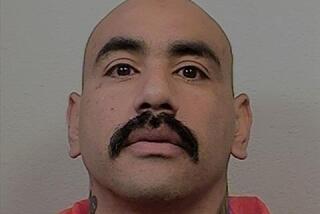Once Lost, He’s Found His Calling
They found the body, that of an 18-year-old man, on a Tuesday morning in early October, near the railroad tracks about a mile from Robert Calderon’s house. “He died a horrible death,” Calderon says. “They slit his wrist and possibly cut out his tongue. They bled him to death.”
It was the kind of murder Calderon knew about only too well. Coming of age in the ‘60s and ‘70s around Long Beach and Redondo, Calderon grew up in the gang culture. He says his father handed him his first gun when he was 10, telling him to wait in the car with the .38 while he provoked a fight with another man. The plan, Calderon says, was that he would toss the gun to his father if his dad got in over his head. Instead, Calderon says, his father beat the man senseless with a board. “Then, he drove home like it was nothing.”
Calderon’s life story appeared written by the time he hit 20: hanging out with other gangbangers who fueled themselves with drugs and alcohol and paid for it all with robberies and burglaries. The moments of clarity--when he wasn’t high and privately lamented the way his life was going--were too fleeting to produce meaningful change.
Then, he did change. A former girlfriend introduced Calderon, 25, homeless and living in a park, to a pastor. For the next six months, Calderon attended Tuesday night services in Long Beach, then returned to the park. Slowly, but irrevocably, the world began to look different.
He saw other men as lost as he was. He moved in with another pastor and became a Christian.
“Where I found a sense of purpose was realizing there were thousands of others like me, lost, who didn’t know how to find their way back to reality,” Calderon says.
Basically illiterate, Calderon followed the pastor on his rounds. Occasionally, because of his background, Calderon would be asked by the pastor to talk to gang members seeking help. That’s how Calderon discovered a calling.
Now 39 and renting a house in San Juan Capistrano, Calderon was ordained earlier this year by the local Calvary Chapel. He had already begun an informal ministry known as God’s Gang. Besides holding weekly Bible meetings in his living room, which about 30 people regularly attend, Calderon has spoken at schools and other functions on the gang crisis and how he tries to combat it with his faith.
“The people at Robert’s Bible study really believe he cares for them, and he does,” says Craig Whittaker, executive pastor at Calvary Chapel. “He has a genuine heart for the people. He’s not trying to build a ministry to a certain number. He just has a heart to love people and share the gospel with them.”
Calderon walked away from street life but says it isn’t easy.
“Being involved in gangs makes you co-dependent,” he says. “You’re so dependent on them. Leaving that life would be like dropping you into the darkest of jungles. It’s like, ‘How do I survive?’ You just get kind of trapped in the hopelessness of it.”
Calderon believes his three years in town have established his credibility with gang members, even those who don’t attend his prayer meetings. He has gone to court with some of them, counseled some of them. One of his strategies was to identify gang leaders and buy Christmas presents for their children.
The murder by the railroad tracks last month provided some measure of his impact. Within days, gang members who were friends of the dead man asked Calderon to pray for their friend at the murder site. Calderon obliged, then put together a memorial concert in early November at a church.
“Gang life is so violent now that when you’re in that situation, you begin to think of eternity,” he says. “[They ask], ‘Where am I going to spend eternity?’ So many young people right now, gang members, they don’t show it but they live in constant fear. They’re involved in drug transactions, fear of police--even though they don’t admit it--other gangs, violence, AIDS. All these things they deal with on a daily basis puts a lot of pressure on them.”
If, in those moments of vulnerability they come calling on Calderon, he thinks he can help.
“Growing up in the gangs, that’s their faith, that’s their religion,” he says. “That’s why we call this God’s Gang. We’re like the bridge to the local church. Maybe they’re not ready to be in a church, but this is the first step. They see a pastor who looks like them, who understands them, and they see other people similar to them who know what they’re going through. That makes this a safe place for them.”
It would make a nice story to say that Calderon will single-handedly transform the gang scene in San Juan Capistrano. He won’t.
One by one, Calderon says. If nothing else, gangbangers know his house on Calle La Purisma offers them an alternative, a different voice to listen to on the street.
“Before,” he says, “there was only one voice.”
Dana Parsons’ column appears Wednesday, Friday and Sunday. Readers may reach Parsons by calling (714) 966-7821, by writing to him at The Times Orange County Edition, 1375 Sunflower Ave., Costa Mesa, CA 92626, or by e-mail at dana.parsons@latimes.com.
More to Read
Sign up for Essential California
The most important California stories and recommendations in your inbox every morning.
You may occasionally receive promotional content from the Los Angeles Times.










